There’s no two ways about it – I’m very, very impressed with Koi wa Ameagari no You ni. Not only is it a superb series, but it’s getting better – deeper, subtler and more profound – as we get to know the cast and the pathos of the premise asserts itself. I never would have said a show with this theme could be as superb as this one, but I underestimated the maturity and sensitivity Koi wa Ameagari was going to bring to the table. Even if it turns out that 2018 is a great anime year (and I can say with near-certainty that it won’t be based on the series announcements we’ve seen) it’s hard to imagine a scenario where this series isn’t highly-placed in the year-end list.
We’ve only three episodes left after this one (and that reflects an unusual 12-episode NoitaminA run) but I’m glad Watanabe and Akao-sensei chose to devote this one mainly to the subject of friendship. If it wasn’t already obvious, this show isn’t a romance in the conventional sense – the romantic feelings between Masami and Akira are only a part of its overall fabric. This theme shed some light on their relationship to be sure, but even more it allowed Watanabe to explore Masami’s character in more depth than ever before – and there’s a lot of depth there to be explored.
We start out where we left off – with Akira and Haruka meeting for the matsuri, in full yukata and trimmings. Her brother (Sawashiro Chihiro) – turns out his name is Shou-chan – is there, along with what I assume are their younger twin sisters. Even 17 year-olds get nostalgic, it seems (more powerfully than oldsters would ever credit them for, I think) and these two are clearly longing for a simpler time in their friendship. But there’s a gulf between them now, and when (yet another) chance meeting with Masami (with Yuuto in tow) clues Haruka in to what’s really going on in Akira’s head, she loses it. Sadly, you can’t go home again – even at 17.
Truly, though, this episode is mostly about Masami and his friendship. The friend in question is Kujo Chihiro (the truly great Miyamoto Mitsuru) – and I confess I totally misread who that was. It’s not Masami’s ex-wife but his best friend from college (the wife was Midori-san, who wrote for the same doujinshi as they did), a friend Masami hadn’t seen for 10 years. Masami goes to meet Chihiro-san in Takadanobaba, a popular hangout for Waseda University students. Nostalgia was definitely in the air here, because ‘Baba was a hangout for me too – it was close to my Kagurazaka apartment and I spent many a day or evening there, browsing bookshops, slurping ramen or popping into Shirokuma Cafe.
There are certain passages in Koi wa Ameagari which are simply exquisite, perfect – the work of a master director at his best – and this scene at the “cheap, tasty and loud” izakaya (and on the streets of Takadanobaba afterwards) is one of them. This series is wonderful at gently highlighting the differences between 45 year-olds and 17 year-olds, and at exploring the place where their paths cross, and I love Akira as a character. But let’s be honest – anime may not act like it, but a 45 year-old is going to be more interesting than a 17 year-old the vast majority of the time. They’re simply going to have more story to tell – more pain, more struggle, more triumph, more disappointment. And more context.
Masami is such a fascinating man, his story so agonizingly real and relatable. He is, in a word, an exemplar of how it’s possible to be extraordinary and ordinary at the same time. And for that reason the character is a perfect marriage with the actor, because no seiyuu (possibly ever) captures that as adroitly as Hirata Hiroaki. He and Miyamoto-san are masters at work here, packing volumes worth of significance into every line of dialogue. These dear friends, too, have grown apart – in their case it was a woman (perhaps they both loved her, perhaps not) and, I suspect, a gap in success that gradually formed a wedge between Masami and Chihiro.
That said, the bond still exists. Why? Because the past still exists – what they shared cannot ever be taken away. “We’re not adults – we’re classmates”, Chihiro tells Masami – and it’s significant enough that he repeats it to Akira later in the episode. Of course it comes as no surprise that Masami secretly writes novels – surely we’ve all guessed that by now. To have the soul of a writer and not be able to share what you express – this is a pain only another writer can understand. As cavalier as he is, it’s obvious that Chihiro-san is agonized to see his brother and colleague adrift in life – and, like Haruka, hurt that his friend can’t confide in him as he did. But the bond still exists, and he makes it clear that the door is always open should Masami ever decide to walk through it.
It’s no coincidence that the college magazine those two (and Midori) worked on is called “Nostalgia”, because that theme runs through this episode and the entire series. One of the benefits of being middle-aged is that, on occasion, we can see ourselves in the sufferings of the young, and gently try to steer them to calmer waters. There’s no subtext in Masami’s gentle counsel to Akira outside the restaurant under the supermoon, no hidden agenda – he simply recongizes the pain she’s going through with Haruka, and wants to help her put it into context and accept it as a valuable part of growing up. It’s a beautiful moment in a beautiful episode, and it’s part of what’s proving to be a beautiful story.


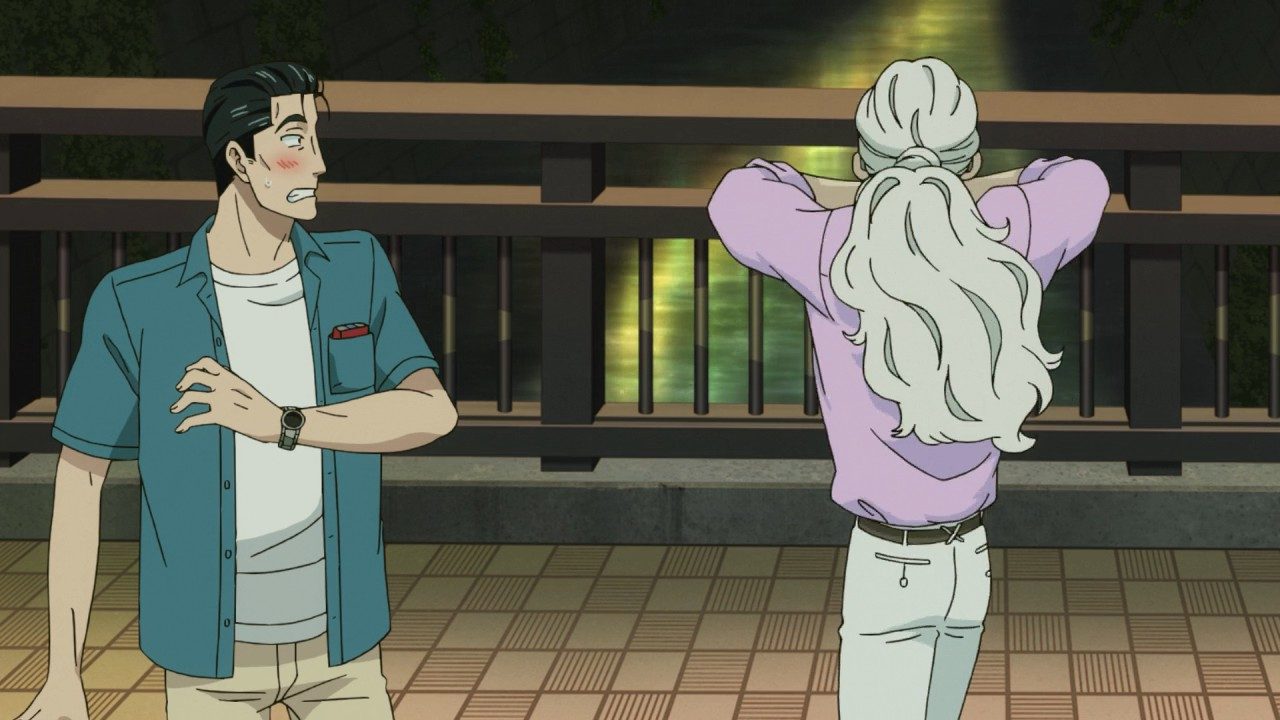


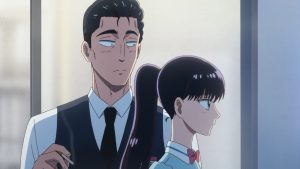


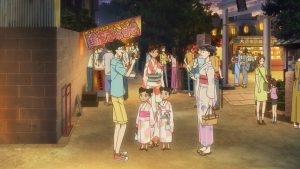

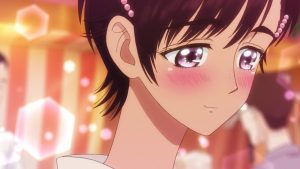
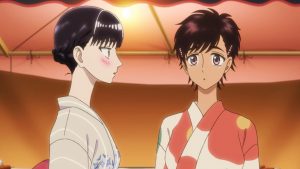
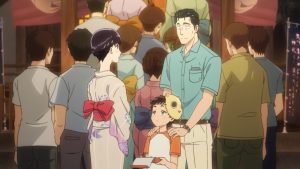

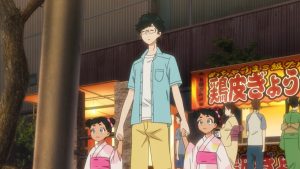



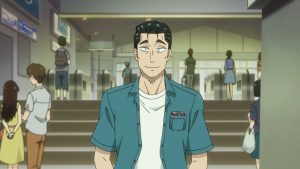
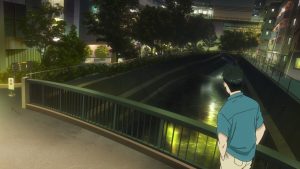

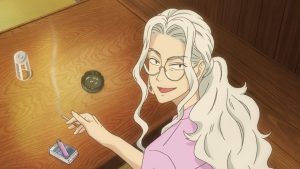
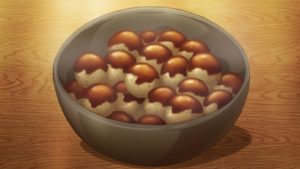


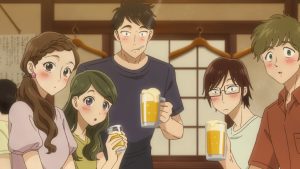
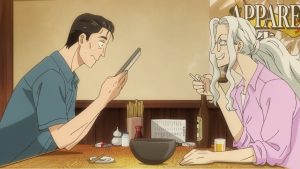
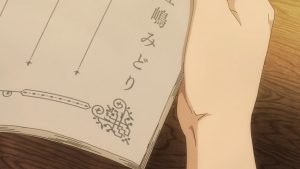


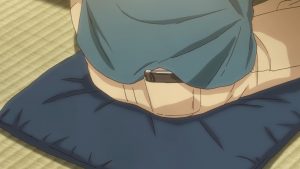


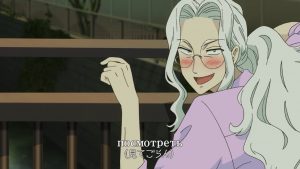


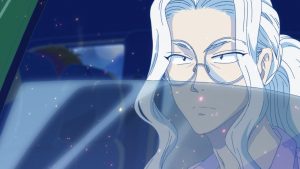

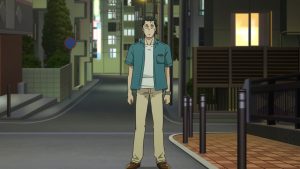
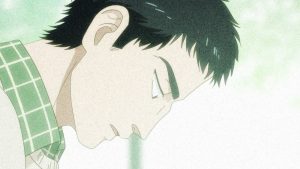










Yukie
March 9, 2018 at 7:02 amWhat a wonderful review. After Rakugo Shinjuu last year, I was not expecting to see realistic, human drama in anime for a very long time. Guess I was wrong. If there’s material like this getting made, there’s still hope in the medium (and hope for other mangas to be animated as well).
Guardian Enzo
March 9, 2018 at 7:52 amIt’s hard to feel hopeful right now, given the increasing preponderance of iseakai LN and cute girls shows in 2018-19’s new series announcements. And Netflix isn’t making me optimistic yet – the jury is still out there as far as I’m concerned. Yet shows like this still do pop up – it’s just that they’re increasingly isolated.
Yukie
March 10, 2018 at 8:12 amI agree about Netflix. I feel like they’re trying too hard to make anime fit the Netflix model: violence, sex, and action. A lot of the shows they produce pretty much contain all three, often gratuitously.
Panino Manino
March 9, 2018 at 6:30 pmBelieve now people? This story was not creepy at all!
“because ‘Baba was a hangout for me too”
Seriously? Are you a nihonjin?
Guardian Enzo
March 9, 2018 at 7:21 pmI don’t get it – why do you have to be Japanese to hang in Takadanobaba? Plenty of foreigners there – Waseda has a lot of foreign students and faculty.
Panino Manino
March 10, 2018 at 4:20 pmThat’s why I asked.
Guardian Enzo
March 10, 2018 at 5:33 pmTokyo is full of gaijin, love it or hate it. One can – if they so choose – immerse oneself in an expat bubble, never learning Japanese and having minimal exposure to daily life as Japanese Edoites live it. That was one of the reasons I liked places like ‘Baba – they’re international, but still mostly local.
Mayuf
March 9, 2018 at 7:29 pmThanks 😀